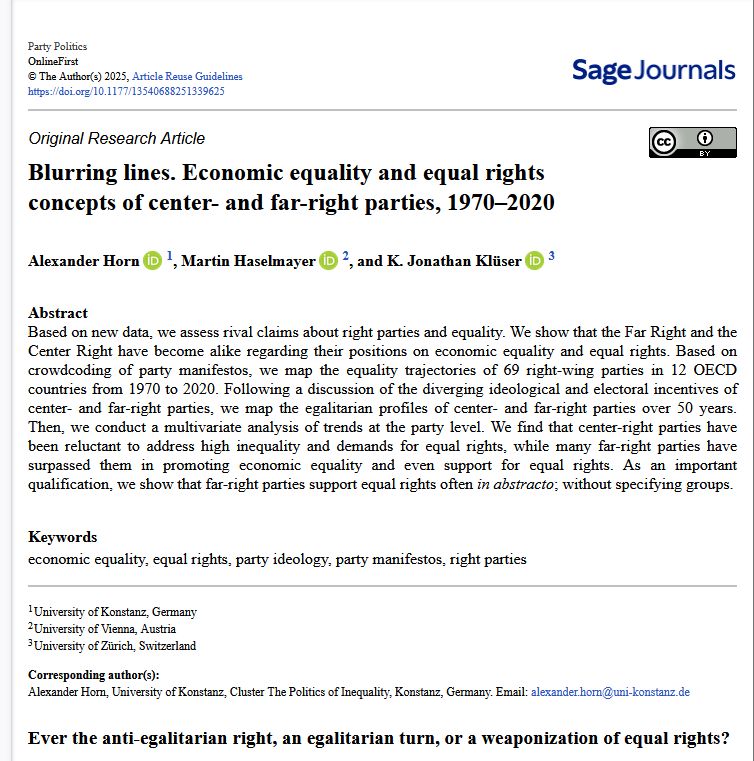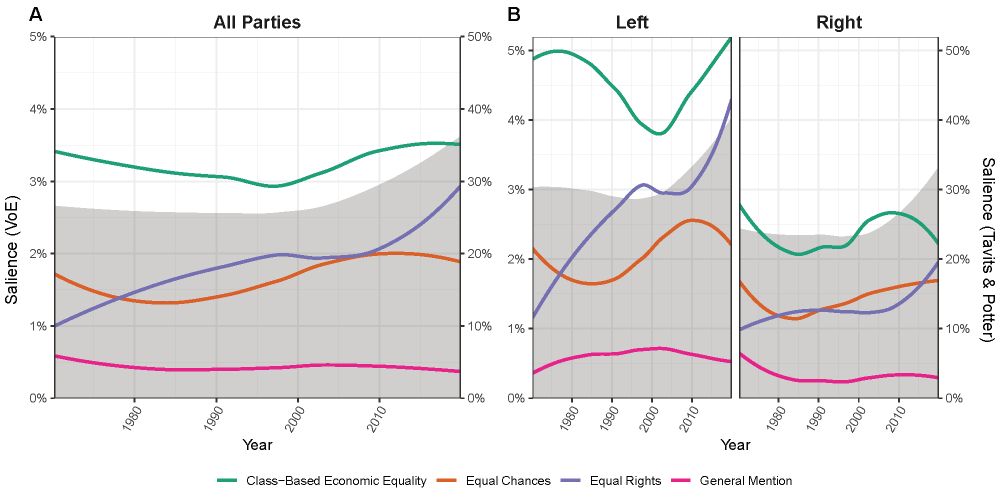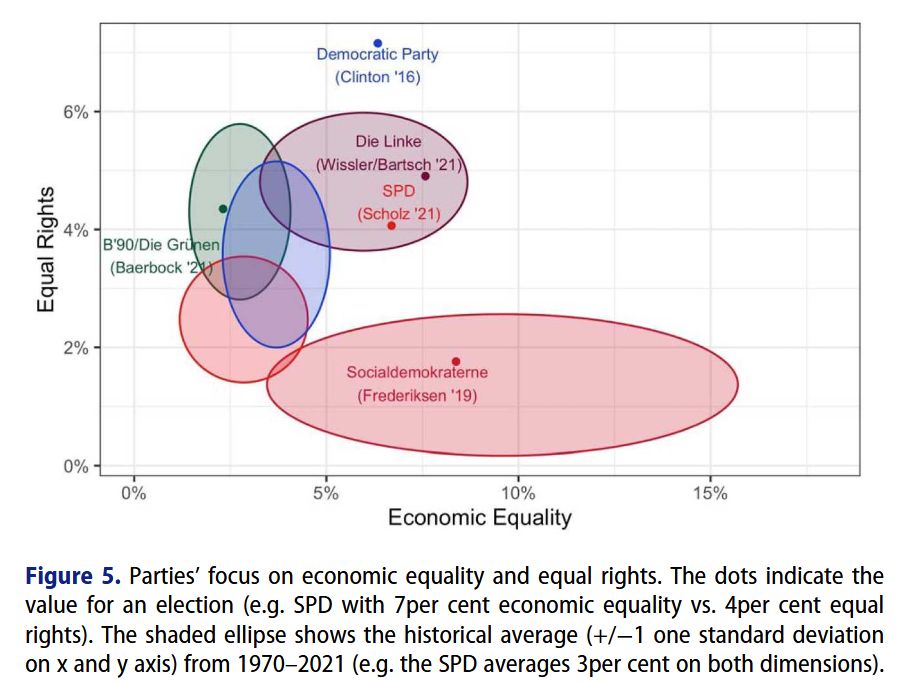Like I get three reviews and one of them is obviously low effort and misses the mark.I still feel forced to react to such reviews in good faith even though it might actually make my article slightly worse, imo.
05.12.2025 01:51 — 👍 0 🔁 0 💬 0 📌 0
None of this is to downplay your role as an editor Per, please don't take this the wrong way! Eg when you recently asked me to reivew on a paper ( I think you know what I am talking about).
At the same time, (and this does not apply to you), I have so often wished for more editor activism.
05.12.2025 01:50 — 👍 0 🔁 0 💬 1 📌 0
One implication is that rejections per se are only a weak signal for your paper being bad. I guess more than anything this model helps me to make sense of all the rejection I have had to face as an academic.
03.12.2025 18:13 — 👍 0 🔁 0 💬 1 📌 0
Of course me as a writer can influence the writing quality, but apart from that I cannot control the reviewer pool. So a lot of variance (i.e. getting rejected even though "I have the best project ever") is expected due to who gets to review.
03.12.2025 18:13 — 👍 0 🔁 0 💬 1 📌 0
I would be able to destroy the best papers in a review; I could also let through the worst ones. So my subjective stance is very important.
03.12.2025 18:13 — 👍 0 🔁 0 💬 1 📌 0
Why the fishing in the pond metaphor? I think publishing has a very large variation, and you have to fish for the "right" reviewers.
03.12.2025 18:13 — 👍 0 🔁 0 💬 1 📌 0
I would like to subject my personal review process model to the test: publishing is like fishing. You can influence two things. (1) the pond (i.e. the journal quality = acceptance rate) and (2) fishing skill = manuscript quality. Getting accepted is a game of probability.
03.12.2025 18:13 — 👍 0 🔁 0 💬 1 📌 0
I originally meant to write much more but got sidetracked, so here it is:
03.12.2025 18:13 — 👍 0 🔁 0 💬 1 📌 0
Without having read this thread first, I would like to subject my personal review process model to the test: publishing is like fishing. You can influence two things. (1) the journal (i.e. the journal quality/acceptance rate) and (2) manuscript quality. Getting accepted is a game of proportions.
26.11.2025 20:53 — 👍 2 🔁 0 💬 1 📌 0
YouTube video by hara kiri2
Chayenne Theme (1 hour version)
Try this www.youtube.com/watch?v=aWbu...
20.11.2025 13:56 — 👍 2 🔁 0 💬 0 📌 0

This is the first time I see one of my packages used in an actual journal article. Cool stuff! This is the fedistr Stata command for those wondering.
19.11.2025 08:34 — 👍 3 🔁 0 💬 0 📌 0
Free eprints for my JEPOP article
www.tandfonline.com/eprint/JN5C9...
17.11.2025 16:12 — 👍 1 🔁 1 💬 0 📌 0
Frank and I have a new-ish chapter out reviewing the electoral politics of welfare state reforms. A preprint is available on my website (leoahrens.eu/publications).
doi.org/10.4337/9781...
10.11.2025 07:48 — 👍 5 🔁 1 💬 0 📌 0
I don't quite understand why you are not happy / what you mean by these examples.
03.11.2025 19:25 — 👍 0 🔁 0 💬 0 📌 0
My command uses heatplot internally. Takes one line in Stata instead of many to make things look professional. I needed to fiddle with heatplot for a long time to get what I wanted. But I think now that this may be too marginal for a package release.
03.11.2025 19:23 — 👍 1 🔁 0 💬 0 📌 0
Thanks for the suggestion! That should be easy to implement.
02.11.2025 16:47 — 👍 0 🔁 0 💬 0 📌 0
My package is essentially a wrapper for heatplot. It uses heatplot but cuts away all the setup and figure layout so you can just type one line and it will look fine.
02.11.2025 13:18 — 👍 0 🔁 0 💬 0 📌 0

I drafted a correlation heatmap package for Stata. Does something like this already exist? I want to make sure before I put more work into this.
02.11.2025 12:49 — 👍 5 🔁 5 💬 4 📌 0


Today at 2 and tomorrow at 12, these two panels take place at @apsa.bsky.social. The papers are so intriguing that I finished reading them pre-arrival! 😱 @leoahrens.bsky.social & me also present. Including work on the class biases in pledge breaking
#APSA2025 #polisky @apsainequality.bsky.social
11.09.2025 16:25 — 👍 4 🔁 4 💬 0 📌 0
I feel the same! At the same time, it has lead me to believe that policy preferences are not as important as suggested by the literature.
13.07.2025 11:10 — 👍 2 🔁 0 💬 0 📌 0
What do you think about Achen/Bartel's Democracy for Realists? I really liked the book but its implications are dire for my research field (& my past research), which commonly relies on the "folk theory" of democracy
10.07.2025 09:58 — 👍 5 🔁 3 💬 1 📌 0

1/3) 📣Out in Party Politics:
We trace the equal rights and economic equality positions of 69 center-right and far-right parties since 1970 in 12 countries. We find that center right parties did not react to/address equal rights concerns and economic inequality
journals.sagepub.com/doi/epub/10....
04.07.2025 10:18 — 👍 45 🔁 16 💬 1 📌 0

📬🚩
Our article on parties' programmatic responses to inequality - and more often the lack of responses - will come out in APSR!
Here is the @excinequality.bsky.social working paper:
kops.uni-konstanz.de/bitstreams/4...
with @klueserthan.bsky.social & Martin Haselmayer 🧗🙏
23.06.2025 09:05 — 👍 30 🔁 6 💬 1 📌 0
Just like Economists are unaware that multilevel models exist!
07.05.2025 12:36 — 👍 1 🔁 0 💬 0 📌 0
I'll leave this here
07.05.2025 11:38 — 👍 1 🔁 0 💬 1 📌 0

Did German left parties abandon economic equality in favor of equal rights, as the diagnosis of the "Lifestyle-Left" suggests? Analyzing party programs since 1970, we caution against sweeping claims in Unequal German Democracy (open access). 3 key qualifications👇
www.tandfonline.com/doi/full/10....
14.03.2025 11:20 — 👍 47 🔁 17 💬 1 📌 1
That would be much appreciated! Thank you
06.06.2024 15:38 — 👍 0 🔁 0 💬 0 📌 0
data from a wide variety of countries.
06.06.2024 13:51 — 👍 1 🔁 0 💬 0 📌 0
more credible identification to lend credibility to the theory. Even in this optimal world, the cross-sectional analysis still has value—it offers evidence supporting the claim that the credible causal effect estimates from, say, an experiment are “replicated” in observational
06.06.2024 13:51 — 👍 1 🔁 0 💬 1 📌 0
I am fully aware of the weaknesses relating to causal identification of the present paper, but it can show that real-world data is consistent with the presented theory. Optimally, further people will do connected research and use a different approach with
06.06.2024 13:51 — 👍 1 🔁 0 💬 1 📌 0
I try to put straight lines through things but usually fail. Try to be Bayesian when I can. Views my own. RT/like != endorsement.
Researcher in political science at @UniOslo | Comparative politics, public opinion, and public policy. Coffee, food, aviation, and space exploration enthusiast.
www.miroslavnemcok.com
Doctoral Researcher in Political Science @dynamics.bsky.social & Research Associate @hertieschool.bsky.social | Sometimes working at Zeit Online | Interested in political geography, inequality and elections.
Quantitative Social Science at UCL. Climate Change, Environmental + Urban Sociology, Spatial Demography and Methods, with ❤️ for Fixed Effects and 🚴
PoliSci PhD student @ Harvard / 🇬🇧🏳️🌈 / Creator of MyLittleCrony.com
Signal: @sehill.11
Chair Professor of Methods, Dean of Research, Faculty SoWi, Uni Bamberg. POSTS ARE PRIVATE!
Friendly engineer at Convex.dev
Assistant Professor, Political Science, University of Oslo. Political/electoral behaviour & party politics, cleavages and social class. https://sites.google.com/view/peterla/start
Head of Noether Group "Varieties of Egalitarianism" @Uni Konstanz | Interim prof @HU Berlin for Comparative Analysis of Political Systems | inequality, parties, policy change, welfare state, ideology, political text | https://voe-project.org
Associate Professor in Political Science at NTNU | Voter accountability, partisan biases, information and inequality |
Postdoctoral Research Fellow at Sciences Po Paris (AxPo & CEE) | PhD from Cluster "The Politics of Inequality" (Uni Konstanz) | CPE, green transition, tech change, labour markets, welfare states | she/her
https://sites.google.com/view/sophia-stutzmann
Emmy Noether Fellow | Techical University of Munich | #citizens #diversity #EU #climatechange #news #textanalysis #css
Professor of Comparative Politics
University of Konstanz
Senior Researcher @cmi_no, PI @EXCInequality & @InclusionIndia, PhD @UZH_en social protection 🇮🇳🇧🇩 & women's career choices 🇮🇳.
Parteien, Pol. Kommunikation, Demokratie, Wahlen @Uni Hamburg | Co-Host Podcast „unter 3“ @Phoenix | Autorin „Defekte Debatten“ @suhrkamp | 🪄 | 🇮🇹 | 🫧 |
Prof. Most tweets about R. “Polisci, it’s all about what’s going on.”
http://arelbundock.com
Chasing wealth and income, present and past, onshore and offshore.
https://gabriel-zucman.eu
https://www.taxobservatory.eu
I am here for all interesting and funny posts on the social sciences, broadly understood and including open science and meta science, academia, teaching and research. https://linktr.ee/ingorohlfing
Professor of political science at the University of Zurich • digital technology, AI & politics • resting bitch face • https://fabriziogilardi.org/
Political Scientist at JGU Mainz, Germany.
Research on public opinion, elections, parties, and democracy (more at: https://www.nilssteiner.com/).
Spokesperson of the AK Wahlen (@dvpw.bsky.social).
Associate editor at @pvs-journal.bsky.social.







